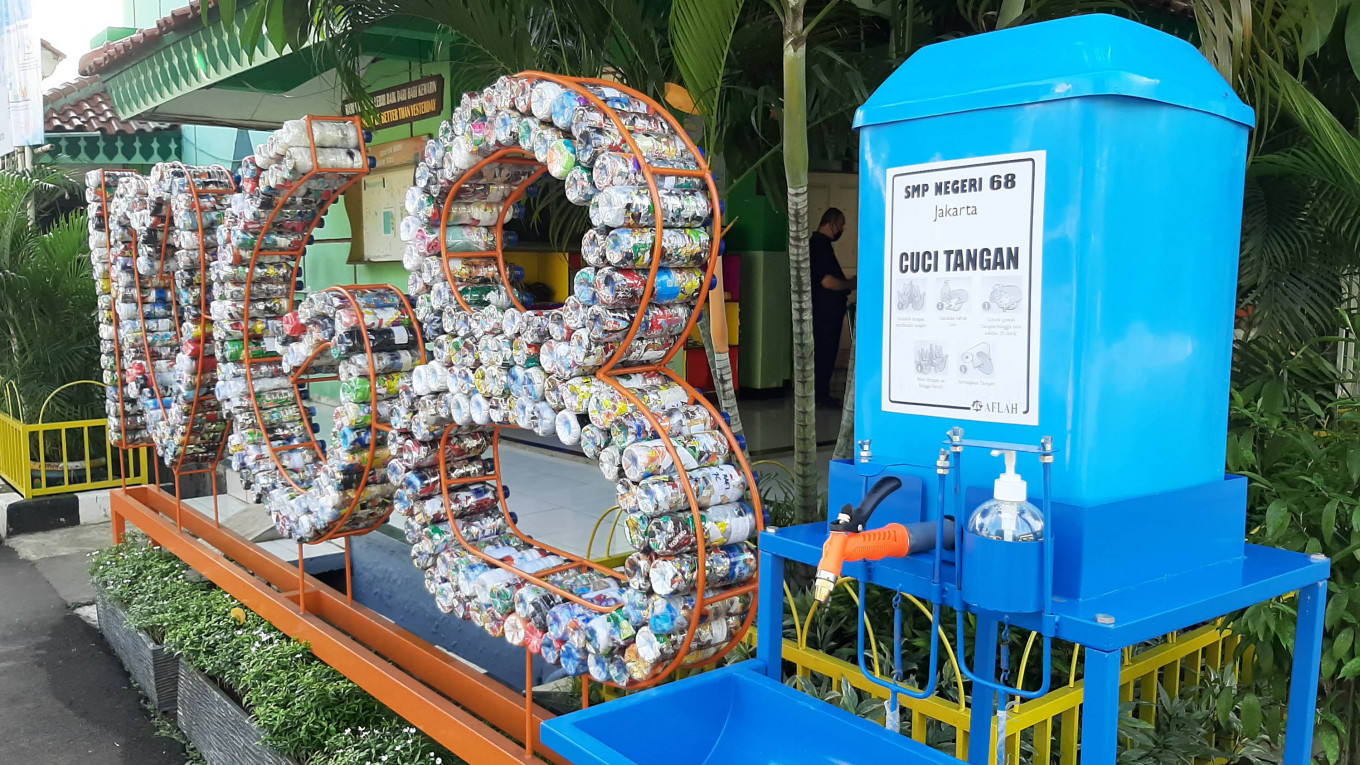Popular Reads
Top Results
Can't find what you're looking for?
View all search resultsPopular Reads
Top Results
Can't find what you're looking for?
View all search resultsNo one left behind: Handwashing saves lives
An elderly woman in Sumbawa regency said that, without the health worker who came to her house to explain about COVID-19 and teach her how to wash her hands correctly during critical times, she would not know that this behavior was important for her survival.
Change text size
Gift Premium Articles
to Anyone
C
an you imagine losing a war while holding a powerful weapon? This could be a reality for people who simply do not practice correct handwashing behavior during this COVID-19 pandemic. Handwashing with soap is one of the most important things we can do to prevent against getting infected with the coronavirus.
However, not everyone is religiously practicing this important habit at critical times. For some, it is simply because the correct information is not reaching them. For others, it might be because the behavior is not so easy to adopt, so they need a little help through behavior change intervention.
During our initial COVID-19 response through the Water for Women project, we found there were vulnerable groups that faced barriers to getting correct information about how to prevent COVID-19.
An elderly woman in Sumbawa regency said that, without the health worker who came to her house to explain about COVID-19 and teach her how to wash her hands correctly during critical times, she would not know that this behavior was important for her survival.
In rural areas of Manggarai regency, people prefer our COVID-19 information to be translated into the local language. Another case of misinformation concerned some our disabled beneficiaries, who initially assumed that to prevent COVID-19, they needed to wash their hands with disinfectant only.
Learning from and working with our beneficiaries, we designed our COVID-19 information to reach everyone by eliminating the language barriers, fulfilling the specific needs of people with disabilities by using different types of media communications preferred by locals, and ensuring everyone is reached through house-to-house direct health promotion.
Is giving information enough to make sure people are practicing correct handwashing behavior? Absolutely not! Even during this pandemic. Have you ever seen people wearing a mask on their chin in a crowd in the urban red zones? Then it is possible the same people do not wash their hands correctly at critical times.
Those city people must have received COVID-19 information. However, they still don’t practice it.
This is in line with what researchers say, that increasing knowledge is not enough to trigger people to practice correct handwashing behavior.
A study in Ghana, Tanzania, Uganda, Madagascar, Senegal, Kenya, India, China, Vietnam, Kyrgyzstan and Peru found that fear of disease was only a motivator when there was a clear and present danger such as an outbreak. The main motivators for handwashing behavior were disgust, affiliation, nurture, comfort, including social status and prestige.
As overwhelming and confusing information could reduce the adoption of desired behavior. Our health promotion keeps the critical times for handwashing to after defecation/toilet use, after handling child feces, after touching animals, before preparing food, before feeding a child, before eating and before touching faces.
That is why, through our Water, Sanitation and Hygiene (WASH) program, as part of our COVID-19 response, our intervention is focusing on behavior change with an emphasis on the motivators explained above.
With support from the Australian government, in the Water for Women project, we have reached 198,663 people including women, children, the elderly and people with disabilities in 105 villages.
About 92 percent of the households we monitored have to practice correct handwashing behavior based on the Health Ministry standard in the Community-Based Total Sanitation (STBM) program. The minimum criteria are 1) Having handwashing stations with soap in the vicinity — near the toilet, kitchen and at the front of the house, especially with relation to COVID-19 prevention, 2) Knowing at least three critical times for washing hands, and 3) Practicing correct handwashing technique.
However, consistent monitoring is really important to ensure the behavior is consistent, as slippage is very likely to happen especially during this long pandemic. After a long fight people will usually feel worn out. This is the phenomenon we are seeing now that even in red zones there are still crowds and there are people who do not wear a mask in public. This situation calls for a strong emphasis on behavior change intervention with continuous monitoring effort.
The Health Ministry already has existing resources for this, which is STBM with an emphasis on handwashing in its second pillar. The ministry has sanitarians in every health center responsible for ensuring household hygiene behavior.
However, their current data ( monev.stbm.kemkes.go.id) show that only 22 provinces in Indonesia show progress in handwashing, with Yogyakarta at the top with less than 15 percent access.
If handwashing is so important during this pandemic, then STBM should be one of our powerful weapons to be utilized and the data should look more promising.
Before the health system collapse by people flooding the hospital with COVID-19, how about keeping them safe starting from their house by simply implementing handwashing behavior change intervention. People can stay safe not only by getting the correct information and having a handwashing station with soap and hand sanitizer, but also by religiously washing their hands with soap.
As we commemorate Global Handwashing Day tomorrow, let’s start using the cheap weapon, handwashing behavior change intervention, to save millions of lives. And because it is cheap, there is no reason to leave anyone behind, especially the vulnerable ones.
***
Water for Women project manager, Plan International Indonesia










